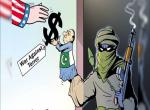Hyderabad blasts were waiting to happen; why they weren’t prevented is a longer story of deliberate diversion.
For nations, it matters what happens to them; but the course of their history is often determined less by what happened and more by how they reacted. What is happening to India on the terrorist front is bad, but what is worse is the way we are reacting to it.
The worst reaction of a government to such a serious national challenge would be to underplay it, divert the discourse from core issues to the peripherals. Asserting that all is well and nothing needs to be changed, emphasising maintenance of social harmony as the core concern, complimenting people for bravely suffering losses and returning to normal lives, talking about human rights and protection of minorities — these are all laudable objectives. No one disputes them, but they do not address the core issues.
In the face of a threat as serious as this, the national focus should be on: how serious is the threat; its long and short-term implications; our capacities to counter the threat, both in policy formulation and policy execution; and how to address the deficiencies. This would involve considering ways to leverage civil society, media, the scientific community, religious leaders to the best national advantage; ways to neutralise the fast-growing domestic base of terrorism, including availability of hardware and human resource, collaborative linkages of the terrorists with organised crime, gun runners, drug syndicates, hawala operators, subversive radical groups, and how to break the nexus. Debate on the adequacy of the country’s laws, judicial administration, security systems and doctrines, etc, in the light of assessed threats is also important. The right discourse should also centre on our policy options vis-à-vis countries and groups involved in terrorist incidents in India. This is not happening, and that’s the tragedy.
It is not happening because a basic requirement is missing: a political culture that can subordinate electoral and other political considerations to the nation’s supreme sovereign interests. This requires the political will and ability to carry the whole country together. If the nation fails to do so, it may face many Hyderabads, and worse.
That Hyderabad is on the terrorist radar has been well known for quite some time. Here are a few illustrative events that could have served as alerts to undertake surgical operations, covert and overt, to sanitise the city, whatever the cost.
On April 1, 2007, an ISI agent, Maqsood Ahmed, was arrested while recruiting youths for sabotage and espionage activities. Neither was he thoroughly interrogated nor was follow-up action taken. On May 20, 2007, Mohamed Sayeed was arrested by the West Bengal police from Jharkhand’s Jantara district. He gave copious details of his links with terrorist modules in Hyderabad. On May 25, 2007, Shoaib Faqruddin Jagirdar, muttawali (custodian) of a local dargah, was arrested for sending RDX and youths from Jalna in Maharashtra to Hyderabad for terrorist actions. He was reportedly released under political pressure. On June 15, 2007, Mohamed Abdul Sattar, an ISI agent, confessed he had received armed training in Pakistan along with Shahid who was responsible for the May 18 Hyderabad blasts. On August 12, 2007, the Aurangabad police seized 29 kg of ammonium nitrate explosive, abandoned by a man who came from Secunderabad (near Hyderabad).
If we have to win the battle against terror, political considerations, communal pressures, administrative and police lethargy, and a weak legal-judicial regime will have to be negated. Let us not sugarcoat our response, like announcing that India and Pakistan as victims of terrorism are in the same league, lest we sent ambiguous signals to India’s enemies.
It is a myth that terrorists strike anywhere, any time and against any target. Had that been so, they would have caused havoc not just in India. Terrorists strike where their intentions and capabilities meet the opportunities. The success of counter-terrorism lies in degrading their capabilities, forcing them to change their intentions and denying them opportunities to strike. We appear to be failing on all three counts.
Their extended capabilities are obvious by their spreading the arc of violence to cover almost the entire country. The fact that masterminds and critical perpetrators of all the recent terrorist depredations remain by and large unidentified is a matter of concern. This brings the deterrence threshold down. There is no change in the intentions of those within and outside the country who seek to bleed India, appeasement within and peace parleys outside notwithstanding. We have also not been able to deny them the opportunities. All these infirmities can be corrected only through an integrated strategic and tactical action plan aimed at empowering and enabling security agencies, strengthening our legal-judicial response regime, upgrading intelligence, and complementing our defensive regime with defensive offence capabilities.
Besides the government and its security agencies, civil society has a seminal role in this. The nation has not been able to produce a powerful ideological movement within the Muslim community to counter the radicals and deprive them of religious legitimacy within the community. The last few years have witnessed alarming growth of Salafism and Wahabism at the cost of the indigenous variant of Islam, which is more tolerant and accommodative. Funding to such organisations from outside the country also has to be stopped, if need be, by further strengthening our laws on the subject and their implementation.
India’s neighbourhood, particularly Pakistan, Bangladesh and Afghanistan, must be understood. Fundamentalist forces have acquired strengths, resources and capabilities to survive and strike on their own strength. They have global collaborative linkages, sustainable channels of funding, access to modern technology and an unending stream of jihadis keen to kill and die. The global growth of Islamic radicalism, proximity of jihadi epicentres close to Indian borders and the tilting of some sections of Muslims within the country pose real problems. The imported variety of terrorism whose planning, infrastructure and resources are of foreign origin will continue to haunt us for quite some time.
The current phase of terrorism has a marked Bangladeshi dimension, closely linked to illegal immigration. Most of the recent cases are linked to Harkat-ul-Jihad-e Islami, which operates from Bangladesh, where it has an extensive network. Al-Qaeda’s linkages with HUJI are old and intimate with total ideological convergence. Al-Qaeda is out-sourcing terror through franchised groups, who enjoy local advantages and can raise their own resources and operate as stand-alone entities. A special action plan needs to be formulated to contain HUJI’s entrenchment.
All this will happen if we bring the discourse on the right track and set priorities right. We need to do a quick VED analysis focusing on the vitals, keeping a watch on the essentials and leaving the desirables till the vitals have been achieved and essentials addressed. For those who govern, let political interests, at best, fall in the category of desirables.
The author is a former chief of the Intelligence Bureau
Published in The Indian Express on August 30, 2007









Post new comment